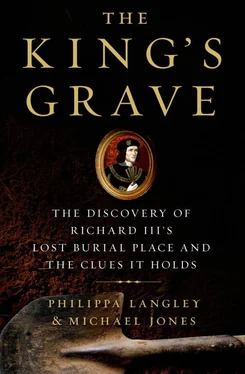The Argument for Richard III’s Innocence Regarding the Deaths of the Princes in the Tower
All anyone can truly say regarding the fate of Edward IV’s sons, the Princes in the Tower, is that they disappeared. Who was responsible for their disappearance, and how it occurred, is not known.
We don’t know how, why or when, or who moved them, or where to. The widespread belief that they were killed is purely tradition – an assumption based on two things. First, gossip and rumour spread during a (failed) uprising aimed at killing Richard and replacing him on the throne. And second, uncorroborated statements put out by the French-backed invader Henry Tudor and his partisans, to justify the deaths of Richard and so many other loyal Englishmen at Bosworth. Traditional belief also telescopes the events of that summer before they disappeared, supposing that people thought the boys dead at a time when we know the Woodvilles were actually forming alliances to restore them to the succession. The Tudor version would have us believe that the queen mother heard that her sons were dead, accepted the fact unquestioningly, and immediately started plotting to promote the dangerously ambitious Tudors. Real life is not so neat and tidy, and unless she saw their bodies with her own eyes, you have to wonder what evidence of their death would be sufficient to convince her to abandon their cause. This is why we have to be so wary of unsupported claims by Tudor writers.
The speculation has always been that it was Richard III himself who killed his nephews, an allegation based on hearsay and gossip originating, in the most part, after King Richard’s death. During Richard’s lifetime, there are four sources who quote gossip accusing Richard, all foreign. In 1483 the story was circulating at the court of the French king, England’s enemy Louis XI, but at the time the boys were very much alive. Then, later in 1483, Dominic Mancini, a foreign visitor to England with contacts at court (including the princes’ own doctor) made enquiries but admitted he wasn’t able to discover anything.
In January 1484, again in France, the French Chancellor, Guillaume de Rochefort, addressing the Estates-General, accused Richard of the murder. With a vulnerable new boy-king on the French throne, and attempting to counteract a backlash against royal authority, his speech was a calculated rallying cry urging his listeners not to emulate the dreadful English and their ‘regicidal proclivities’ as one historian has put it. The reciting of catalogues of murdered English monarchs seems to have been a favourite theme in French politics, and one needs to bear in mind Franco-English hostility before taking Rochefort’s accusations at face value. Moreover, this speech came after Buckingham’s rebellion when many of Richard’s enemies had fled to Henry Tudor in nearby Brittany. The fourth contemporary reference is one from the visiting German knight Nicolas von Poppelau, who spent several days in Richard’s company. Recording his thoughts in his private journal, presumably for his eyes only, Poppelau noted down some rumours he had heard, including one that said Richard had killed the princes, but added that he didn’t believe it.
Indeed, if Richard were indicted with the crime today no court would, or could, convict him. In 1984 Channel 4 broadcast a unique programme, The Trial of King Richard III, which put him in the dock on the charge of murder. After four hours of deliberation, Richard was declared not guilty.
There had been a shift in the speculation that Richard killed his nephews, from suspicion that he carried out the murders himself to supposition that he ordered others to do it. The princes were last heard of in the summer of 1483: Richard was then in the north on his royal progress around the kingdom. Would he be likely to send men south to do his dirty work for him, and trust that no one in the Tower of London, a busy royal palace, got word of it? This seems not only illogical, but inordinately risky. Richard was the anointed king, declared as such by the Three Estates, the Lords, Church and Commons, whereas the boys had been declared illegitimate. But he was also newly crowned, and yet to make his mark. To order the murder of the sons of Edward IV, even if he felt able to divert suspicion away from himself, would lay him open to the danger of the worst kind of odium at the vulnerable start of his reign. Is it reasonable to assume he believed his nephews were such a threat that it was worth taking this risk? Did the failed attempt to rescue (or abduct) them from the Tower in the summer of 1483 change Richard’s perception of the threat they posed?
Let’s imagine that it did. Does this reckless act fit with everything else we know about Richard? Certainly he could be decisive, brutal even, and authorize executions. In his role as Constable of England under Edward IV he had sweeping powers, including those of conviction and sentence without appeal in cases of insurrection and treason.
However, he is not known to have executed anyone who in his day would have been presumed innocents – women, priests, children – or against whom no proof of guilt could be found. Summary executions would only become a regular means of disposal during the reigns of the Tudor monarchs. In fact, there are at least two occasions when Richard showed clemency, possibly even naïvety. In autumn 1483 Margaret Beaufort, wife of Thomas, Lord Stanley and mother of Henry Tudor, was found guilty of conspiring against Richard during Buckingham’s rebellion. As the act of a traitor this warranted the death penalty. Instead she was simply confined under house arrest under the control of her husband.
In 1483, at the Council meeting of 13 June that led to the execution of William, Lord Hastings for treason, there were seven arrests. These included Beaufort’s husband, Thomas, Lord Stanley, Thomas Rotherham, Archbishop of York, and John Morton, Bishop of Ely. All were released, Morton into the care of the Duke of Buckingham. Rotherham and Stanley remained in government circles, and Morton was offered a pardon. The latter two, though treated mercifully by Richard, later acted against him. With hindsight, had Richard considered executing such ‘innocents’, it could be argued that he might never have needed to fight the Battle of Bosworth.
The princes’ mother, Elizabeth Woodville, is known to have made her peace with Richard early in 1484 when she emerged from Westminster, where she had taken sanctuary, and Richard promised to treat her well and arrange appropriate marriages for her daughters. Richard acted honourably in this, and the following year negotiated a marriage for Elizabeth’s eldest daughter, Elizabeth of York, to the Portuguese Duke of Beja, who later became King Manuel I. Elizabeth of York was the princess who, according to Henry Tudor, was supposedly promised to him by her mother. After Richard’s death the marriage negotiations were halted. Richard treated the women fairly, especially since the Yorkist claim to the throne came through the female line, and Edward IV’s daughters could be perceived as a threat to him.
Not only did Elizabeth Woodville reconcile herself to Richard, but she also wrote to her eldest son, Thomas, Marquis of Dorset, who was in France with Henry Tudor, asking him to return to England so that he too could make his peace with Richard. Dorset tried to do so, but was caught and imprisoned by Henry Tudor before he could escape. It seems most unlikely that if Elizabeth believed Richard had murdered the two princes, she would risk the life of a third son. And if she was under duress, after Richard died she would surely have denounced him for murdering her sons.
But Elizabeth Woodville said nothing about the fate of her sons. However, she did take action; she immediately supported a rebellion against Henry Tudor, now King Henry VII, in the name of Lambert Simnel, a possible stalking horse for the return of Edward V. This, when her eldest daughter Elizabeth of York was Tudor’s wife and Queen of England. The rebellion against Henry Tudor failed and as a result of her involvement, Elizabeth was imprisoned by Henry In Bermondsey Abbey where she died in poverty. Elizabeth Woodville’s actions tell us two things: she either had incontrovertible knowledge that her sons were alive, or not enough proof that they were dead; either way she knew that Richard hadn’t killed them.
Читать дальше












